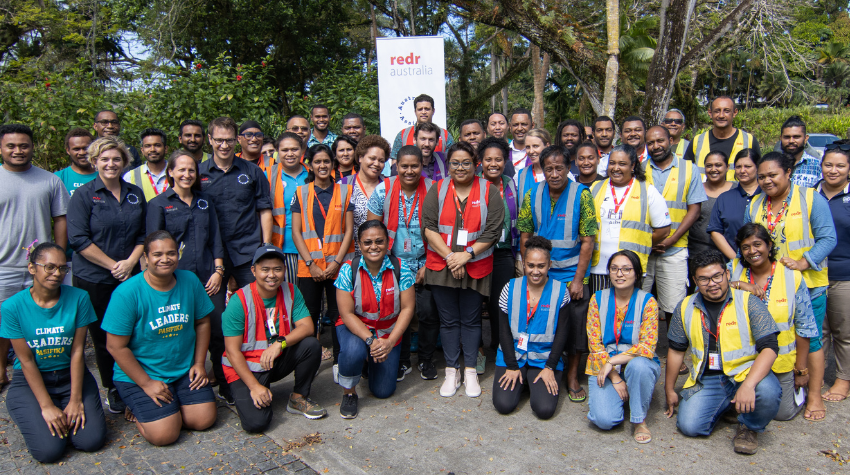As a humanitarian agency working in communities impacted by crises and conflict, RedR Australia has a duty of care to minimise and manage any risks to the security and wellbeing of staff and deployees.
Prevention — the golden rule for enabling workplace safety
This year, RedR Australia’s Manager Strategy and Risk, Nic Sutherland and Regional Manager Middle East and Africa, Dave Simpson reflect on enabling deployees and partners to make informed and accountable decisions early. This has not only helped keep employees safe, but maximised the efficiency of RedR Australia’s humanitarian impact.
Dave said, "A robust approach to safety enables our humanitarians to be deployed to complex environments.
"Through training and regular briefings, we support our staff and deployees to work — and stay safe — in changing or uncertain circumstances. This allows them to achieve great outcomes.
"It’s important work, and rewarding to help those who are directly engaged in humanitarian programming," Dave said.
With COVID-19 came new risks
RedR Australia’s COVID-19 Action Review confirmed that while the pandemic may have tested our operational processes and systems, it also demonstrated the robust nature of our risk management framework.
RedR Australia initially paused deployments while assessing the pandemic’s risk to deployees and communities. Some specialists returned home, while others remained in-country where we were able to ensure their safety.
Additional insurance coverage was necessary before we could consider any new deployments, but the issue of travel permissions and quarantine requirements remained. This remains an ongoing challenge today.
Dave reflected, "COVID-19 has been a significant new stressor, but unfortunately competes with a range of other challenges facing the region. In the Middle East and Africa, we’re often dealing with rapidly changing situations that can be hard to predict, and hard to plan for.
"Different countries have adapted to the ‘new normal’ in different ways and at different paces. From a security perspective, the evolving pandemic has been an additional situation to monitor and be responsive to as it affects our staff and deployees," Dave said.
Prioritising local efforts
Nic said the pandemic has provided an opportunity for RedR Australia to accelerate localisation priorities – that is, increased local ownership and leadership of humanitarian action. Illustrating this, many deployees mobilised to roles within their home countries or regions.
"Transitioning to locally-led efforts has been a priority for our sector for some time, and COVID-19 has fast-tracked that for our operations.
"Last year, we designed and delivered our first Essentials of Humanitarian Practice course in the Pacific together with our network of local experts. By tailoring it to a Pacific context, RedR Australia was able to strengthen the capacity of local humanitarian and disaster management specialists.
"It also highlighted the incredible local knowledge and experience of Pacific humanitarians, particularly in preparing for and responding to climate crises," Nic said.
Thirty-four participants representing 8 nationalities – 84 per cent being from Pacific Island countries – attended the pilot course, with 89 per cent reporting that the course was adequately adapted to the Pacific context.
Nic added, "As a result, RedR Australia has become more flexible with our training requirements to recognise that local deployees already have a baseline of preparedness for working – and staying safe – together with local communities.
"We enable every humanitarian on the ground to take responsibility for keeping themselves, their partners and the communities in which they work safe. When our deployees carry out their work and make decisions with their own safety front of mind, it helps us to support them in their roles," Nic said.
Looking to the future
At least 13 additional countries are projected to experience new conflicts between 2020 and 2022, relative to pre-pandemic forecasts, in response to government responses to COVID-19 and the global economic downturn.
Nic said humanitarianism provides opportunities for specialists from all professions and backgrounds to contribute to conflict and disaster preparedness and response.
"RedR Australia has the capacity to deploy into a number of host organisations, including United Nations agencies, government ministries and emergency management bodies – all of which work in a variety of contexts and circumstances.
"We know the Pacific is one of the world’s most climate emergency prone regions, with deployees supporting responses to cyclones, flooding, landslides and volcanic eruptions. Alternatively, some specialists may find their skills are better suited to supporting humanitarian efforts in long term conflict affected communities.
"The sector really benefits from our people bringing a diverse range of skills and knowledge to ongoing humanitarian efforts around the world," Nic said.
Make a donation to support RedR Australia’s work in disaster and conflict affected communities.
Learn more about World Humanitarian Day and how to take #ClimateAction.


